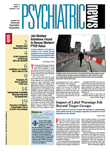The final rule listing proof-of-citizenship requirements for Medicaid eligibility was released in July by the Centers for Medicare and Medicaid Services (CMS). The rule has loosened the much-maligned requirements in the interim rule that had been in effect since last July.
The changes reflected in the final rule came in response to more than 1,400 public comments—including those from APA. It was published in the July 13 Federal Register and went into effect that same day.
The rule stemmed from the Deficit Reduction Act of 2005 (DRA), which required states to verify the identity and prove citizenship of current or potential Medicaid beneficiaries. The restrictions aimed to prevent undocumented immigrants from falsely claiming to be citizens and receiving benefits. Until passage of the DRA, Medicaid applicants in most states needed only to “self-attest” to U.S. citizenship under penalty of perjury (Psychiatric News, September 15, 2006). Documentation was required only from those whose citizenship status was in doubt.
The interim rule had exempted beneficiaries who received Medicare and Supplemental Security Income, because they had already met documentation requirements. The final rule expands this exemption to include people eligible for Social Security Disability Insurance.
Also exempted are children receiving adoption assistance or foster-care payments. In making that change, CMS responded to concerns from many, including APA, that children in foster care may have a hard time documenting citizenship and thus may not be able to obtain needed health care coverage under Medicaid. Foster children, APA pointed out, may be even more likely to need mental health care than other beneficiaries.
Also, as required by the Tax Relief and Health Care Act of 2006, the responsibility to verify the citizenship or immigration status of children in foster care who receive Medicaid benefits rests with the states instead of foster parents.
The final rule includes a CMS policy change that extends Medicaid benefits for up to the first year of life to a newborn whose mother was receiving Medicaid on the date of the child's birth, regardless of the mother's immigration status.
The final rule also expands the list of documents to prove citizenship status and identity beyond such documents as a U.S. passport, naturalization certificate, or certificate of U.S. citizenship. The newly approved documents include religious records filed in the United States within three months of a child's birth, as well as some school records. The Roll of Alaska Natives also was approved as evidence of citizenship.
In recent months, two independent reports have found that Medicaid's citizenship documentation requirements under the interim rule led to citizens' losing Medicaid coverage without the government's achieving the savings sought.
The Government Accountability Office (GAO) found that eligible citizens faced barriers to access when applying for Medicaid coverage under the interim rule documentation requirements. Data from 22 of 44 states studied by the GAO showed a decline in eligible citizens' Medicaid enrollment and delays in obtaining coverage.
Another report, conducted by the majority staff of the House Committee on Oversight and Government Reform, investigated nine states and found that for every $100 spent to administer the documentation requirements, the federal government saved only 14 cents.
“By way of comparison, for every $100 the Office of the Inspector General of the Department of Health and Human Services expends to investigate waste, fraud, and abuse, the federal government recovers nearly $1,300,” committee chair Rep. Henry Waxman (D-Calif.), wrote in the report.
Acting CMS Administrator Leslie Norwalk said in a July 3 press release that the final rule ensures that Medicaid dollars are “spent effectively on those who are qualified for coverage.” Norwalk resigned on July 20.
Further loosening of the citizenship requirements may come through reauthorization of the State Children's Health Insurance Program (SCHIP), which also is subject to the requirements. Legislation under consideration in the House (HR 3162) and Senate (S 1893) would extend SCHIP eligibility through Medicaid to all newborns within their first year of life, regardless of the mother's immigration status. Further, both SCHIP reauthorization bills would give states the option of returning to pre-DRA citizenship-documentation requirements—including parental testaments to their children's U.S. citizenship under penalty of perjury—for children, with the requirement that the state conduct audits to demonstrate compliance. Opponents said this option ultimately would allow states to set the criteria for citizenship determinations.
The Senate SCHIP reauthorization bill would further reduce administrative barriers to enrollment by encouraging states to standardize their enrollment procedures and eliminate the requirement for face-to-face interviews to complete enrollment.
